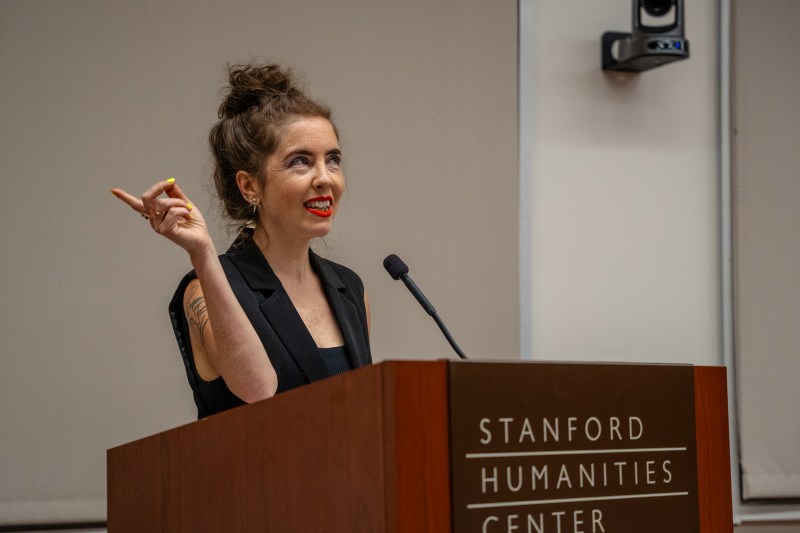Writing captures the breadth of human emotion, so it’s curious that we don’t often find humor taking the center stage in our literary worlds. At Wednesday’s Stegner Fellow reading, two writers reminded us that humor is a vessel that enhances the conveyance of emotions.
In an eclectic mix of poetry and fiction, the second Stegner Fellow reading of the year featured poet Luciana Arbus-Scandiffio, graduate of the Michener Center for Writers, and writer Emily Geminder, author of the fantasy fiction novel “Dead Girls and Other Stories.”
Second-year Stegner fellow Jade Cho said that Arbus-Scandiffio’s work “takes childhood, its joys and its wounds, seriously” in her introduction of the poet. Arbus-Scandiffio, a New Jersey-native who has two lesbian moms, often writes about navigating her identity in school and about the fun of growing up in a place which people often make fun of.
Arbus-Scandiffio feels her experience has its own “hidden wonder and joy.”
While reading excerpts from her poems “Self Talk” and “Half Brother: Letter to Eli,” Arbus-Scandiffio showcased the blend of detail and humor in her narrative. Lines filled with exaggerations and similes like “I cried like seven walruses, their crying so communal that their whiskers formed a mop,” and “my childhood was like loving the dog so much, you licked it,” initiated loud bursts of laughter. The poet had to take a break from reading while the audience caught their breath.
When asked whether she always weaved humor into her writing, Arbus-Scandiffio chuckled and said that she probably wouldn’t be writing poetry today if it didn’t make her laugh a little bit.
“Humor and sadness really do go hand in hand,” Arbus-Scandiffio said, suggesting that humor can be a tool to help the reader experience a full range of emotions.
While introducing Geminder, second-year fellow Ashley Hand described an episode in Geminder’s “lore” where she ran away from home in New Jersey and caught the bus down to Salt Lake City as a teenager. The audience once again chuckled in unison when the anecdote ended with the writer calling her father once she ran out of money.
Geminder’s reading for the night was taken from her currently developing novel, under the working name “The Green Aquarium.” Her work felt familiar yet fresh, taking routine settings and themes but delivering them to the audience through uniquely humorous language.
The author presented example after example to the enraptured audience of how one might take an everyday experience and reshape it into something entirely new. Days became “patterns of light repeating”; she tempered the deeply introspective tone of her work with lighthearted narrations, changing words like alien probe and enema to “alien robe and eczema.”
An audience member asked Geminder how much she feels the narrator in her stories might be herself.
“In some ways I feel like all of it is me, and then in some ways I feel like none of it is me,” Geminder said. According to her, memory can often feel like fiction, leading to a situation where the self and the narrator feel deeply intertwined.
When opening the event, Nick Jenkins, co-director of the Creative Writing Program, noted the beauty of the program comes from knowing members have people that they are writing for and writing to.
Both Geminder and Arbus-Scandiffio echoed this statement in their closing remarks; the family they’ve found amongst the Stegner fellows is a “beautiful and loving” one indeed. Sharing humor and writing with friends can be the most wonderful memories upon which to reminisce later.
Editor’s Note: This article is a review and includes subjective thoughts, opinions and critiques.
